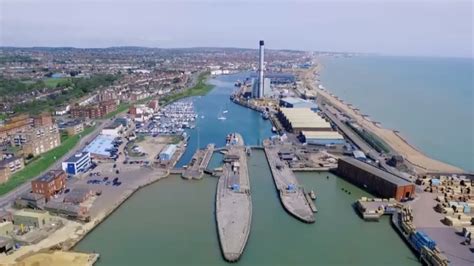Twelve projects are each set to benefit from their share of up to £6 million in government funds targeted at stripping carbon from industrial processes. And ministers are making up to £185 million available for the next round of the government’s Industrial Energy Transformation Fund.
Contestants in the Local Industrial Decarbonisation contest submitted their ideas over three months last summer.
Run in partnership with new technology promoters Innovate UK, today’s awards deliberately seek to favour small businesses operating outside Britain’s main industrial centres, as they adopt lower-carbon techniques. D-ESNZ officials estimate such companies account for 55% of the country’s industrial emissions.
Today’s winners include ventures centred on:
- Shoreham Port Industrial Cluster, an established hub – pictured – with 175 businesses based on 110 acres. These will explore ways to reduce emissions and improve local air quality by working with local authorities
- The Industrial Decarbonisation office for Northern Ireland (ID-NI), which will develop plans to help local businesses increase their productivity, at the same time cutting emissions
- Decarbonising the Midlands Aerospace Cluster (DMAC), who will work with key players in the region’s aerospace supply chain, identifying manufacturing processes that contribute to greenhouse gas emissions and potential solutions.
Lord Callanan, minister for energy efficiency and green finance, announced that new government money today becomes available under the IETF for more small enterprises wishing to follow suit, by swapping energy expertise in clusters.
“With over £190m available for businesses to make the move to cleaner, cheaper energy – and with 12 projects benefiting directly today – we are delivering the support they need to decarbonise,” said the minister.
Over 150 projects have already benefitted from IETF grants, the minister noted.
From sponsors Innovate UK, competition director Bryony Livesey said:
“Today’s announcement shows the keenness of businesses to collaborate on plans to decarbonise by forming local industrial clusters and working together to drive down emissions”, she said. “This is a crucial step in tackling decarbonisation at dispersed sites on the UK’s journey towards net zero by 2050”.
More details here.




